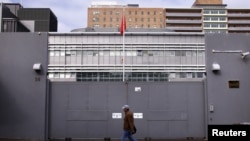Australia says it is suspending its extradition treaty with Hong Kong after China began enforcing a new national security law there. To extradite means to send a person who has been accused of a crime to another state or country for trial.
Prime Minister Scott Morrison told reporters the new law – which took effect last week – marked a “fundamental change” that led Australia to suspend the agreement.
Morrison also announced the country would extend temporary visas for an additional five years for 10,000 Hong Kong citizens currently studying and working in Australia. After five years, the visa holders would be able to seek permission to live in the country permanently.
“Australia has always been a very welcoming country to such people,” Morrison said.
Acting Immigration Minister Alan Tudge said the number of Hong Kongers expected to seek to come to Australia under the new rules would only be “in the hundreds or low thousands.”
Morrison also announced Australia will launch measures aimed at getting Hong Kong businesses to move operations to Australia.
The Chinese-backed security law for Hong Kong makes it easier to punish protesters and reduces the city's self-rule powers. It punishes acts of separatism, terrorism and aiding foreign forces.
The new law came after massive and often violent pro-democracy demonstrations in Hong Kong over the past year. Under it, police have new powers to do searches without seeking legal permission. They can also order internet service providers and companies to remove online messages seen as violations of the legislation.
Western governments and human rights activists say the national security law effectively ends the “one country, two systems” policy. Under that rule, Hong Kong is guaranteed the right to its own social, legal and political systems for 50 years following the end of British rule in 1997.
The Chinese Embassy in Canberra issued a statement warning Australia to stop interfering in the affairs of Hong Kong and China. “Otherwise it will lead to nothing but lifting a rock only to hit its own feet,” the statement said.
In Beijing, a foreign ministry spokesman said China could decide to “take further actions" to answer Australia’s moves.
Australia also issued a new travel advisory for Hong Kong, where about 100,000 Australians live and work. The advisory warns citizens they may be “at risk of detention on vaguely defined national security grounds” in Hong Kong.
Other Western governments have taken similar steps in reaction to the national security law. Canada also suspended its extradition treaty with Hong Kong. Britain has offered to permit up to 3 million Hong Kongers to permanently live in Britain if they are eligible for British National Overseas passports.
Australia’s opposition to the national security law added to existing tensions with China, the country’s biggest trading partner.
Chinese officials were angered at Australia’s demand for an international investigation into how the coronavirus pandemic started. The virus was first recognized last year in the Chinese city of Wuhan.
I’m Bryan Lynn.
Bryan Lynn wrote this story for Learning English, based on reports from The Associated Press, Reuters and VOA News. Caty Weaver was the editor.
We want to hear from you. Write to us in the Comments section, and visit our Facebook page.
________________________________________________________________
Words in This Story
fundamental – adj. relating to the most important or main part of something
vague – adj. not exact or clear
eligible – adj. having the right to do something
pandemic – n. an occurrence in which a disease spreads very quickly and affects large number of people around the world





